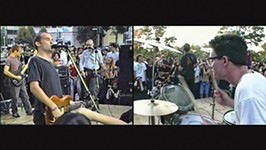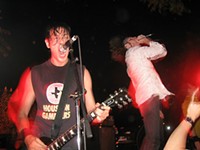Anarchy in Paris
Metal Urbain machine Éric Débris settles in Austin
By Tim Stegall, Fri., Nov. 21, 2014
Even in Paris, 1975 is boring and repressive. Gotham gutter-glam terrors the New York Dolls create a sensation two years earlier when guitarist Johnny Thunders vomits in front of a shocked press corps at Orly Airport, urinates behind his amps mid-show at Édith Piaf's beloved Olympia theatre, then kicks in a heckler's head at the Bataclan. But that was 1973.
Packs of teenage Lou Reed fans in leather and Ray-Bans roam Parisian streets nocturnally, calling themselves Les Punks. Two such guitar players, brothers Hermann Schwartz and Pat Lüger, mix the Velvet Underground with Sixties garage rock in a series of bands. Another young trio – Éric Débris, Rikky Darling, and Zip Zinc – loves delinquent, sleazy rock equally. They're intrigued by Brian Eno's synthesizer experiments in Roxy Music, so they take in concerts by Moog-driven ensembles like German audio specialists Tangerine Dream.
"Every time we came out of these concerts, we'd say, 'Well, why don't they play rock & roll with it?'" muses Débris.
Sitting at Jo's Coffee, five minutes from the South Austin home he's rented the past 18 months, the Frenchman pauses and laughs. Another five minutes east from his local abode sits the Romani Gallery, where for the second half of the East Austin Studio Tour this weekend, he presents a selection of his pinup photos that are as subversive as any of the music he made with Seventies French punk pioneers Metal Urbain. Friday nights, he DJ's in typical cut-and-paste fashion at the Aviary bar and gallery on South Lamar as Doctor Mix.
"We came out of Tangerine Dream and said, 'Maybe we can do something with a beat,'" he continues in a thick French accent while sipping his iced tea.
Maybe something fast.
"The tempo of all the bands was slow," he complains, snapping his fingers approximately one beat every three seconds for emphasis. "I remember at the time hearing Blue Öyster Cult, because everyone was saying they were this really heavy band. So, I went to a gig, and I went, 'What the fuck?!' Pling! Pling! Pling!
"And they were playing really slow!"
Eno granted him license to make music, despite initial difficulty on guitar and bass. Zip Zinc built him primitive synthesizers and oscillators. Eventually, Débris used insurance settlement funds from his father's death to purchase an AKS, the down-market, plastic briefcase version of the VCS 3 synth Eno favored. A primitive Korg rhythm generator of the sort employed by lounge singers was opened up to alter the circuitry, speeding it to thrashy, pre-drum-and-bass tempos.
"I found out you could press three buttons together, like Strauss Waltz with Rock 2 and Jazz, and I could really get something," he laughs.
In April 1976, the Ramones' debut serves as worldwide notice that the aggressive, high-speed rock & roll Débris desired had arrived. He, Darling, and Zinc dub themselves DeSade until the following month, as the Sex Pistols busy themselves writing "Anarchy in the UK" in London. Inspired by Lou Reed, DeSade becomes Metal Urbain.
On one of many scene-making trips Débris makes with pal Clode Panik to the English capital, the pair comes across a spread in one of the UK rock mags declaring "This Is Punk." Metal Urbain's music, aesthetic, and DIY ethic suddenly has a name. Panik assumes vocal duties in November, and after a chaotic debut gig nets the newly formed Cobra Records' interest, Darling and Zinc step aside for the vicious dual fuzz guitars of Lüger and Schwartz.
A week in the studio yields May 1977's excellent 45, "Panik" b/w "Lady Coca Cola," as sensationalist press reports cement punk in worldwide consciousness. All of Metal Urbain's trademarks are firmly in place: electronics, nasty guitars, shock graphics favoring an anarchistic red and black color scheme, a fashion sense based on homemade versions of Vivienne Westwood's Seditionaries designs, and guttural polemics snarled en Français. The music is instantly radical in a rapidly codifying punk scene, even alongside fellow electro punks Suicide and Devo. This isn't the weedy pub rock of groups like Stinky Toys that pass for French "punk."
Which explains why the band was more respected in the UK and even in America. A month's visit to London results in Metal Urbain's next two singles on English labels. Dec. 1977's "Paris Maquis" is Rough Trade Records' first release after the indie record shop had sold 1,500 import copies of "Panik." Their best anthem, "Hystérie Connective," issues via Radar, recording home of Elvis Costello and Nick Lowe. Influential BBC DJ John Peel requests a session.
Even as Wire's "I Am the Fly" sounds suspiciously like the industrial clang of "Lady Coca Cola," French rock critics fawn all over the Sex Pistols et al. while ignoring Metal Urbain's UK imports. ("Didn't you record that for the English market?") Panik exits in mid-'78, leaving lyricist Débris to take over vocals. Lüger and Schwartz's rockabilly obsession increasingly colors the band's music until its February 1980 breakup, yielding the posthumous Les hommes morts sont dangereux LP and band offshoots ranging from Metal Boys to Doctor Mix & the Remix.
South by Southwest 1990 brought Débris to Austin for the first time, in his capacity as French indie imprint Bondage Records' managing director, accompanying the label's Suspense Rubberband.
"It was much smaller than now," chuckles Débris. "I came back almost every year for a long time."
Meantime, like many punk prophets without honor in life, Metal Urbain's reputation grew in death. Steve Albini, after basing Big Black's industrial drum-machine clang on hissy, fifth-generation Metal Urbain cassette dubs, mused, "Why can't people try to sound like Metal Urbain for a change?" Introduced to Débris at a rock festival, Albini dropped to his knees and bowed. The Jesus and Mary Chain's Jim and William Reid inquired about Lüger and Schwartz's distortion pedals.
News of work on a remastered compilation, Anarchy in Paris, brought on reunion interest. Débris, Schwartz, new programmer Charlie H (since replaced by Jérôme Solo), and Lüger's replacement Vott toured the U.S. for the first time, eventually playing SXSW 2004 and 2005. Jello Biafra showcased the harder, angrier post-millennial Metal Urbain on 2006's J'irai chier dans ton vomi LP. Finally tired with the city of light, Débris relocated to Austin with the proceeds from the sale of his Parisian flat.
"That's what's been funding my first year here, but now it's getting closer to the time when I really need to make money!" nods Débris. "I want to stay! I do not want to go back!"
Metal Urbain lives. Débris' band memoir, Un Bon Hippie est un Hippie Mort, awaits English translation, and another LP and tour is in the works. He's recording another Doctor Mix album with fellow French ex-pat guitarist Thierry Le Coz, who recorded in Débris' studio and played in a rockabilly band with Schwartz in his youth. Doctor Mix's DJ Fridays feature his idiosyncratic mixes much like a Metal Urbain tune. Then there's the EAST display of pinup photos, shocking juxtapositions of nude nubiles, paint, and revolutionary slogans. Again, much like Metal Urbain.
"Like Brian Eno, I don't play music," smiles Débris, finishing his iced tea. "I use musicians to play music for me. I do things with machines."
Éric Débris' fine art nudes are on display during the East Austin Studio Tour at the Romani Gallery, 1900 E. 12th, as part of "NudEast and Dark Friends: A Photography Exhibit." Doctor Mix spins Friday nights from 9pm to midnight at Aviary Decor, 2110 S. Lamar.









